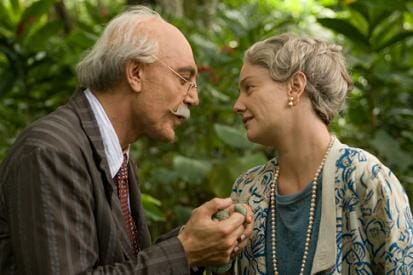Love in the Time of Cholera

Release Date: Nov. 16
Director/Writer: Mike Newell
Cinematographer: Affonso Beato
Starring: Javier Bardem, Giovanna Mezzogiorno, Benjamin Bratt, Liev Schreiber, John Leguizamo
Studio/Run Time: New Line Cinema, 128 mins.
Like most adaptations of great works of literature, Love in the Time of Cholera suffers from the blessing of a great story and the curse of extremely high expectations. Although an adaptation can be enjoyable, oftentimes fans of the original find themselves disappointed by the resulting film, disliking it for what they think it “should” be rather than what it is.
-

-

-

-

-

-

-

-

-

-

-

-

-

-

-

-

-

-

-

-

-

-

-

-

-

-

-

-

-

-

-

-

-

-

-

-

-

-

-

-








































